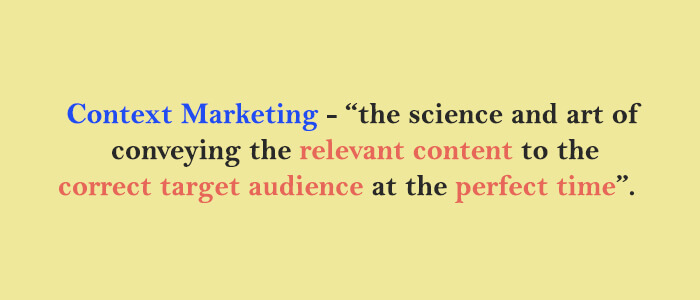Much has been discussed about the importance of ‘Content Marketing’. Brands rely on content marketing to deliver message to audiences for increasing engagement, sales and awareness. But, now a new form of marketing is on the rise- ‘ Context Marketing ’. It is the science and art of conveying the relevant content to the correct target audience at the perfect time .
It has been observed that customers receive unlimited messages, majority of these messages are not relevant and timing of these messages is wrong. These practices have led to the rise of the new-age marketing technique. Context Marketing differs from the Content Marketing in terms of consideration for the right context for the content.
Relevance Matters!
Identifying the correct context is important to achieve success. It is essential for the brands know about their customers to deliver relevant content that is useful for them and does not create a dissonance. Being out of context will take a toll on the marketing effort of any brand. The context based marketing amplifies the value of content for the targeted customers.
Relevant Content : Marketing technique starts with identifying the correct content. In this form of marketing, the content addresses the context of the customers rightly – their emotions and desires. Make sure that the brand interacts with the buyer persona using a smart content, as conversion rate of pages with smart content is almost 20 percent higher than otherwise.
Relevant Customer : Brands need to provide an intuitive experience to the users. Positive marketing results depend on how well the brand knows the users- lifestyle, motivation and needs. Knowing the customers well lets the brand connect, engage and influence them.
Relevant Time : For success in Context Marketing, determining the right time is important to engage with the customers.
Is Context Marketing Important?
Marketers across the globe now aim at delivering tailored and personalized experience to their target customers. For delivering a meaningful experience it is important to know the context of the target audience. Information- what the audiences read, channels they use, jargon or term they are familiar with and how they have interacted with the brand earlier helps to understand the context of customers and craft the content for communication based on it.
Identifying the relevant information is not an uphill task for the brands as there are different social insight tools for the same.
Context based marketing is all about understanding the current state of the customer and engage them with a relevant content. It is beneficial for both the brands and marketers.
- Fast conversions – Recent study shows that location-based offers or deals are redeemed fast. On seeing a personalized coupon, customers tend to spend more.
- Effective offers – Targeted messages, perform better. Worth mentioning is the example of a leading American retail store dealing with outdoor clothing and gear, who had tracked the data of customers spending time near their stores and based on it created offers that performed four times better than the general ones.
- More email views – Targeted emails have more chances of being opened than the static emails. Context based emails increases conversion and engagement of the customers.
A Shift in Marketing Technique
Context Marketing makes the product or service more relevant to the customers. For effective marketing, brands need to shift from the old school techniques to understanding the context of customers better. For this
- Emphasize on interactions- Marketers need to shift from the campaigns and focus on interactions. All contents used for interaction should focus on what users want from companies or brands.
- Engage the customers- Identify the nature of content that will engage the audience rather than targeting solely the customers. Social sharing and dialogues with consumers are two innovative steps for engaging customers and it has already been implemented by noted companies across different segments.
- Customer recognition is a must – Every consumer is unique and the nature of interaction with each should differ. Marketers can utilize the information that they know about customers to customize their experience. For instance, analyzing the browsing and purchasing history often reveals the action that a customer might undertake.
- Identify customer moments- Time plays an important role in this new-era marketing, creating customer moments based on different customer data, will provide a positive outcome. These moments will create opportunities for potential sales and engage the customers.
- Share useful information- Consumers are always on the lookout of useful information rather than mere marketing messages. Valuable, relevant information-rich information content that highlights benefits of consumers is useful.
Where to Start
Digital marketing techniques and strategies evolve constantly. You need not think context marketing as something new, rather a step towards effective and focused marketing. If you are planning to incorporate context marketing into your marketing mix then start with
- Understanding Buyer Persona – Marketers need to understand buyer persona better than before. Understanding of buyer persona should not be restricted to only location, and demography rather know the interest and characteristics of the target customer. They should identify the emotions that shape the needs of target audiences and influence purchase decision.
- Map the Buyer Journey – Today, customers expect that they will receive relevant information through their journey. Marketers can map the buyer’s journey and identify the touch points where the brands can communicate with the audience.
- Get Contextual Data and Implement – Once you have the data of Buyer Persona and Journey, it will be easy to pinpoint the opportunities as how brands can engage customers. Retailers can use this collective data and aid customers to make decisions across their journey.
The key is to gather relevant information and use it to provide personalized experience to customers. Context Marketing techniques has the focus and precision of targeting the right customer with relevant context. Understanding the right context will take the marketing effort to the next level.




